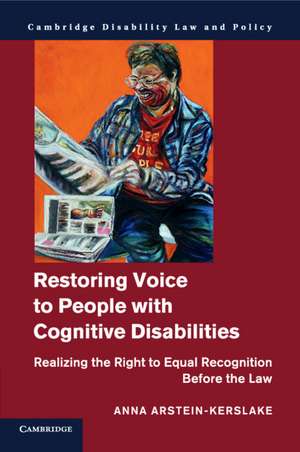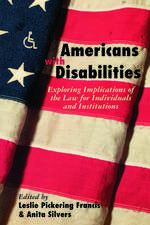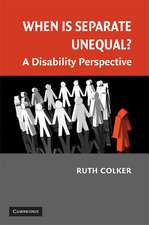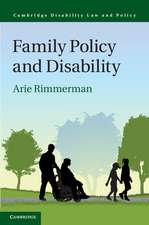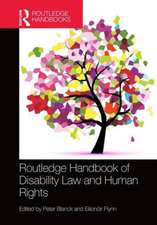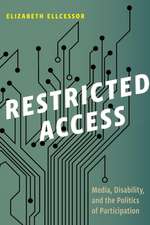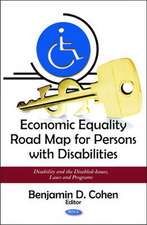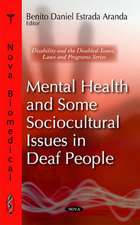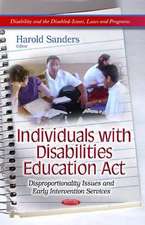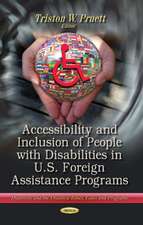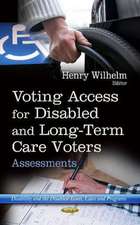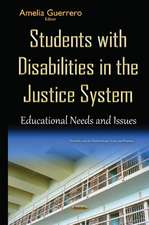Restoring Voice to People with Cognitive Disabilities: Realizing the Right to Equal Recognition before the Law: Cambridge Disability Law and Policy Series
Autor Anna Arstein-Kerslakeen Limba Engleză Paperback – 12 dec 2018
| Toate formatele și edițiile | Preț | Express |
|---|---|---|
| Paperback (1) | 284.17 lei 6-8 săpt. | |
| Cambridge University Press – 12 dec 2018 | 284.17 lei 6-8 săpt. | |
| Hardback (1) | 740.26 lei 6-8 săpt. | |
| Cambridge University Press – 2 iul 2017 | 740.26 lei 6-8 săpt. |
Din seria Cambridge Disability Law and Policy Series
- 14%
 Preț: 737.13 lei
Preț: 737.13 lei -
 Preț: 287.66 lei
Preț: 287.66 lei -
 Preț: 257.70 lei
Preț: 257.70 lei -
 Preț: 322.29 lei
Preț: 322.29 lei -
 Preț: 282.26 lei
Preț: 282.26 lei -
 Preț: 286.30 lei
Preț: 286.30 lei -
 Preț: 358.87 lei
Preț: 358.87 lei -
 Preț: 321.74 lei
Preț: 321.74 lei -
 Preț: 287.19 lei
Preț: 287.19 lei -
 Preț: 286.51 lei
Preț: 286.51 lei -
 Preț: 286.13 lei
Preț: 286.13 lei -
 Preț: 259.73 lei
Preț: 259.73 lei - 14%
 Preț: 722.95 lei
Preț: 722.95 lei -
 Preț: 359.43 lei
Preț: 359.43 lei -
 Preț: 288.04 lei
Preț: 288.04 lei - 14%
 Preț: 725.57 lei
Preț: 725.57 lei -
 Preț: 320.55 lei
Preț: 320.55 lei -
 Preț: 285.54 lei
Preț: 285.54 lei -
 Preț: 264.08 lei
Preț: 264.08 lei -
 Preț: 199.48 lei
Preț: 199.48 lei -
 Preț: 284.78 lei
Preț: 284.78 lei -
 Preț: 233.89 lei
Preț: 233.89 lei -
 Preț: 244.79 lei
Preț: 244.79 lei - 14%
 Preț: 727.91 lei
Preț: 727.91 lei
Preț: 284.17 lei
Nou
Puncte Express: 426
Preț estimativ în valută:
54.38€ • 59.05$ • 45.68£
54.38€ • 59.05$ • 45.68£
Carte tipărită la comandă
Livrare economică 22 aprilie-06 mai
Preluare comenzi: 021 569.72.76
Specificații
ISBN-13: 9781316506547
ISBN-10: 1316506541
Pagini: 271
Dimensiuni: 150 x 230 x 15 mm
Greutate: 0.37 kg
Editura: Cambridge University Press
Colecția Cambridge University Press
Seria Cambridge Disability Law and Policy Series
Locul publicării:New York, United States
ISBN-10: 1316506541
Pagini: 271
Dimensiuni: 150 x 230 x 15 mm
Greutate: 0.37 kg
Editura: Cambridge University Press
Colecția Cambridge University Press
Seria Cambridge Disability Law and Policy Series
Locul publicării:New York, United States
Cuprins
1. Theoretical and historical foundations of the right to equal recognition before the law; 2. The meaning of the right: interpreting Article 12 of the CRPD; 3. The significance of Article 12 of the CRPD: legal capacity as legal personhood and the importance of autonomy; 4. Theoretical tensions in Article 12 of the CRPD: autonomy versus paternalism and liberty versus social support; 5. Denying legal capacity to people with cognitive disability; 6. Case law and the right to legal capacity; 7. Right to legal capacity in all aspects of life; 8. The nature of the support paradigm for people with cognitive disabilities; 9. Good practice in supports for the exercise of legal capacity; 10. Future directions in research and the pragmatics of change; Bibliography; Index.
Notă biografică
Descriere
This book provides a ground-breaking discussion of the human right to make decisions in our own lives.
